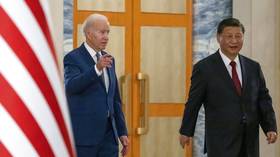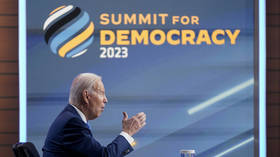China is ‘ghosting’ the US because normal diplomacy has proven useless

A recent Politico article, citing unnamed US officials, claims that China is “ghosting” the US, ignoring American attempts to re-establish diplomatic communications after they broke down in February.
If you aren’t familiar with the term, ‘to ghost’ someone is social media-era slang that means to leave a conversation hanging by suddenly ceasing to reply. This, according to officials cited by Politico, is what’s going on between the US and China, with Secretary of State Antony Blinken attempting to reschedule his Beijing visit, which he canceled after the recent ‘spy balloon’ incident, and the Chinese giving him the diplomatic cold shoulder.
The way the article frames it, Washington is making attempts to “stabilize an increasingly volatile relationship,” but “thin-skinned” Beijing is avoiding engagement because it, among other things, resents US arms sales to Taiwan and US officials’ contacts with Taiwan’s pro-independence politicians.
‘Thin-skinned’ is a baffling description for China’s approach to dealing with the US if one takes a sober look at how things have been developing. Beijing has likely arrived at the conclusion that it is a waste of time to pursue dialogue with Washington, which has failed to demonstrate any good faith whatsoever. Instead, the administration of President Joe Biden has shown itself to be easily susceptible to outbreaks of anti-China hysteria on the domestic political arena, which makes normal diplomacy impossible. Despite the fact that US officials such as Blinken continually talk of the need for so-called ‘guardrails’ in the relationship with Beijing, it is quite clear that the US has little interest in cooperating maturely with China, and there is nothing to be gained from such contact from Beijing’s perspective.
China has demonstrated immense diplomatic patience towards the US over the past few years, even as Washington has been venting relentless hostility towards Beijing, including, but not limited to:
- accusations of genocide;
- blacklisting numerous technology companies;
- attempting to crush China’s technological development;
- backtracking on its commitment to the One-China policy;
- spreading conspiracy theories over the Covid-19 pandemic’s origins;
- building new military alliances such as AUKUS, with the intention of containing China;
- coercing third-party countries into blocking and rejecting key Chinese investments;
- forcing other countries to take sides in an attempt to create a Cold-War-like climate;
- whipping up anti-Chinese paranoia and vilification of China in US domestic politics.
The list is not exhaustive, yet once upon a time, China genuinely believed that these hostile policies were a ‘glitch’ of the Trump administration, and sought to engage Biden positively to try and establish a course correction. It was wrong, it was very wrong. The Biden administration has not only embraced the foreign policy consensus which former President Donald Trump created, but has doubled down on it uncritically and made things even worse. This has empowered hawks in Beijing, including President Xi Jinping himself, who has now directly called out the US, to arrive at the conclusion that the relationship with the US is beyond saving.
The domestic political climate within the US is so toxic that is questionable the Biden administration even controls its foreign policy at all. When a major anti-China ‘idea’ gains political traction within the US, irrespective of the consequences it may have pertaining to US national interests, or on its relationship with China, the Biden administration’s attitude is to ‘bandwagon’ on it, as opposed to resisting it or setting a sensible course. This has allowed the hawks to drive the agenda.
Take, for example, the issue of TikTok, which the Biden administration sought to ignore for a long time, but once a Republican-led push to ban it gained traction, the White House embraced it. Biden also did not originally want to shoot down the alleged spy balloon, but did so as the paranoia around it grew. Similarly, the administration has learned that using China as a political scapegoat allows it to ‘shunt away’, to an extent, the right wing’s attacks, as has been most evident with how it re-embraced the Covid-19 laboratory leak conspiracy theory. These divisive and polarized political circumstances inside the US ultimately make diplomacy impossible, and it is very much noted that even when China has conducted diplomacy with US officials, they have shown a condescending tactic of announcing new sanctions either before or after such meetings, in order to appear ‘tough’.
In conclusion, why bother at all? The US is clearly not a reliable actor or partner. China will continue to ghost the US until it deems that it can attain some acceptable concessions, and thus dictate the flow of dialogue in order to maintain an equal say in the relationship. Until that time, diplomatic efforts and resources are clearly better spent elsewhere. Why put so much commitment into talking with someone who irrationally hates you, brands you as their biggest enemy and threat, and clearly has nothing but hostile intentions towards you?
The statements, views and opinions expressed in this column are solely those of the author and do not necessarily represent those of RT.















